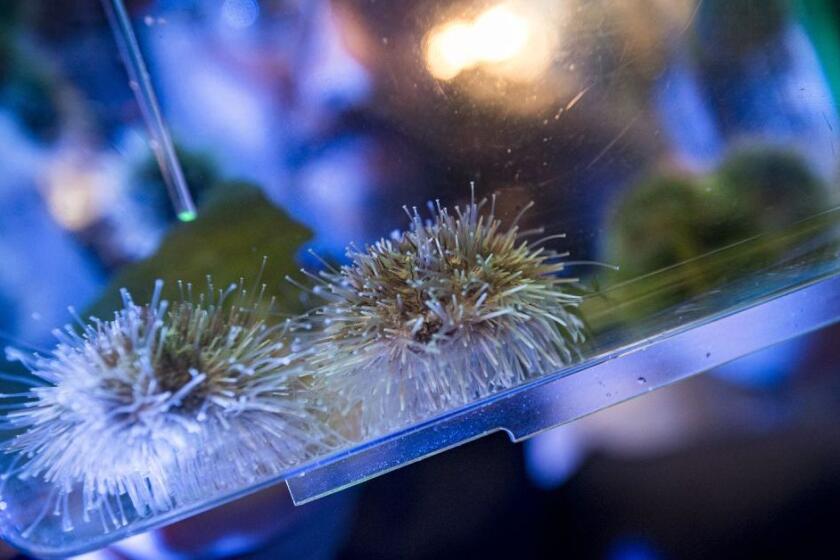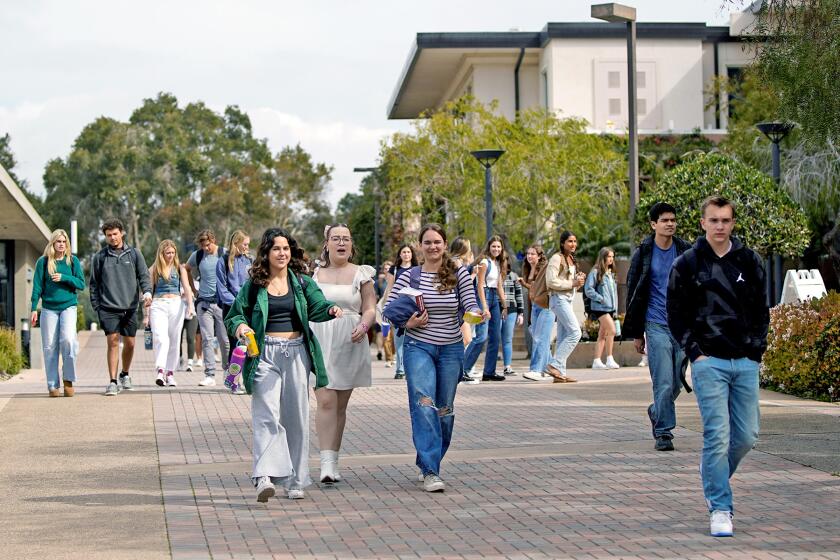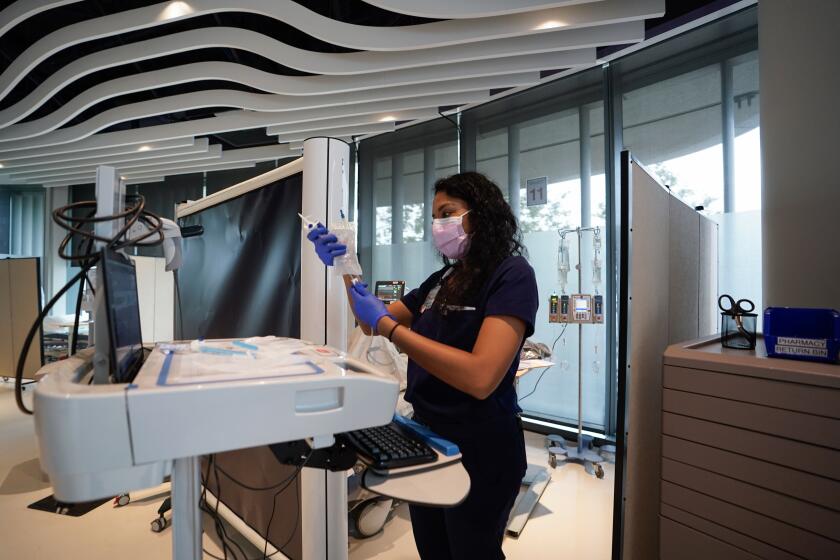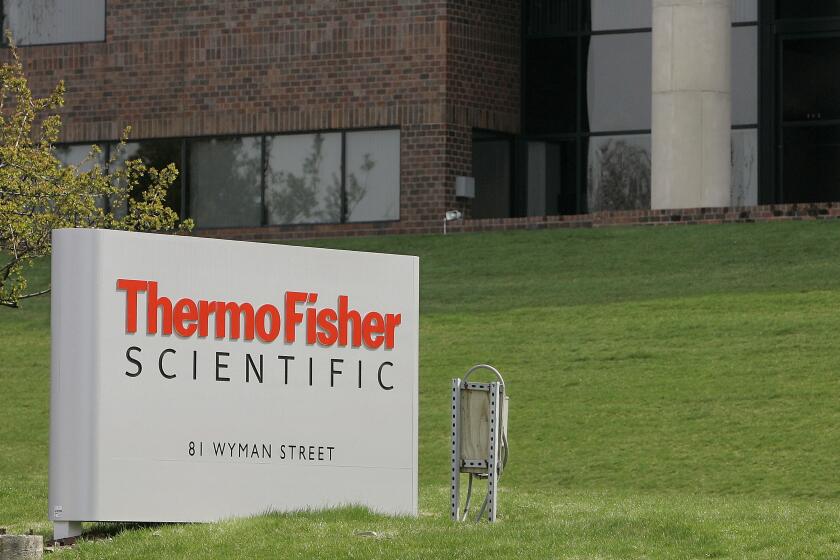Marletta will step down as Scripps chief
Michael Marletta intends to step down as president of the Scripps Research Institute in response to faculty anger over his attempts to quietly sell or merge the financially troubled center to the University of Southern California.
Board Chairman Richard Gephardt said in a statement Monday that Marletta “indicated his desire to leave TSRI and the board is working with Dr. Marletta on a possible transition plan.”
Four of the institute’s scientists said Gephardt definitively told a faculty gathering earlier in the day that Marletta will resign as president and CEO of the institute, which is famous for helping developing such drugs as Humira, to treat arthritis, and leustatin, to treat leukemia. Scripps Research has spun off many companies and it is currently home to two Nobel laureates.
The announcement defused some of the anger researchers have been expressing recently at the main campus in La Jolla and at a satellite location in Jupiter, Florida.
“This is an exciting juncture for The Scripps Research Institute,” cardiologist and geneticist Eric Topol said.
“Although there were problems with its leadership and an ill-conceived, poorly communicated deal with USC, there has never been such a united faculty in the eight years I have been here — and probably for much longer than that,” said Topol, who is also chief academic officer for the Scripps Health network.
James Paulson, chair of the department of cell and molecular biology, said, “I think the faculty were highly appreciative of the board meeting with them this morning. It was a very constructive, positive meeting.”
The board has not appointed an interim president. And Monday’s left several questions unanswered, including: Where will the institute find money to make up for a huge drop in funding from the pharmaceutical industry? How will it raise private donations during a period of unprecedented turmoil? And how will the board work with a faculty that is suspicious of its administration?
Marletta took office in January 2012 focused on shoring up the institute’s finances, which were in a state of flux. His predecessor, Richard Lerner, had helped keep Scripps Research healthy for years by negotiating deals in which the pharmaceutical industry gave the institute lots of money in return for direct access to its discoveries. The last such deal was signed in 2006, when Pfizer agreed to give the institute $100 million over five years to support research. Such big deals have since evaporated as companies have curtailed research budgets.
Marletta was hired to offset the loss of pharma money by raising private donations. The institute’s neighbors, the Salk Institute of Biological Studies and Sanford-Burnham Medical Research Institute, have recently fared well in that area, raising hundreds of millions of dollars. Scripps Research has been unable to do the same. The institute has been further squeezed by growing competition for grants from the National Institutes of Health. Marletta recently estimated that the institute will have a $21 million operating deficit this year.
Paulson said no specific remedies were proposed at the meeting except in generic terms.
“There were some questions from the faculty in how they might help in participate in that process,” Paulson said. “That being said, the obvious is that everything’s on the table right now. Things that are discussed are philanthropy, of course, strategic partnerships, and revenues from intellectual property. Those are the three main things that are being looked at carefully.”
Faculty unrest surfaced publicly in mid-June when it was revealed that Marletta had been negotiating a merger or acquisition with USC. The talks had reached the point where USC offered to pay Scripps Research $15 million a year for 40 years. In return, USC would absorb Scripps Research, essentially buying one of the world’s leading institutes for the study of chemistry and biology. USC isn’t highly ranked in either discipline.
Ten department chairs and a dean sent Marletta an email of protest stating that the envisioned deal would “destroy much of what has been built” at Scripps Research. The letter represented facuty members in La Jolla and at the institute’s satellite campus in Jupiter, Florida. Florida community leaders were unhappy with the deal’s secrecy, according to the Palm Beach Post.
Some professors said they were not opposed to the idea of a partnership. But they objected to Marletta negotiating without significant faculty involvement. And some disliked the idea of becoming part of USC. The anger boiled over; ten department heads and a dean sent Marletta and board chairman Richard Gephardt an email that called the deal damaging. The email involved faculty from La Jolla as well as the institute’s satellite campus in Jupiter, Florida.
Tensions rose further when board member Peter Farrell questioned the authority of faculty, telling U-T San Diego, “If you’re on the board, you say, ‘Who’s running this ship, guys?’ You can make suggestions, but you cannot demand action. In other words, the board’s being told what it’s got to do, and if you don’t do this, we’re going to take our bat and ball and go home.”
Farrell said he sympathized with faculty.
In a comment on the story quoting Farrell, Scripps Institute stem cell researcher Jeanne Loring indicated her displeasure with Farrell’s comments.
“Why would a board member of an organization ‘feel sorry’ for a group that brings in 86 percent of the funding for that organization? That makes no sense,” Loring wrote. “Is he suggesting that we take our money elsewhere?”
The proposed deal with USC subsequently fell through, but the faculty’s anger with Marletta continued. On Monday, he announced through the board that he intends to leave. The date hasn’t been determined.
Erica Ollmann Saphire, a Scripps Research biologist, said Monday that the events of recent weeks will improve the institute.
“I see a better, stronger, more unified institute emerging from this,” Saphire said. “I have seen 200 faculty come together in a unified, positive voice and I see our Board of trustees now standing with us. Now we have a chance to showcase to the community the work and unique advances we make here.”
The complete statement from Gephardt said:
“The Scripps Research Institute (TSRI) Board of Trustees has announced that Dr. Michael Marletta has indicated his desire to leave TSRI and the board is working with Dr. Marletta on a possible transition plan. Should Dr. Marletta depart TSRI, the Board will work to make any transition to new leadership the highest priority. Any such transition will engage all key constituencies in a dialogue about the future direction of this storied institution.”
On June 27, Scripps Research said it would explore other funding options.
On July 9, Scripps announced it and USC had terminated the negotiations.
Get U-T Business in your inbox on Mondays
Get ready for your week with the week’s top business stories from San Diego and California, in your inbox Monday mornings.
You may occasionally receive promotional content from the San Diego Union-Tribune.













